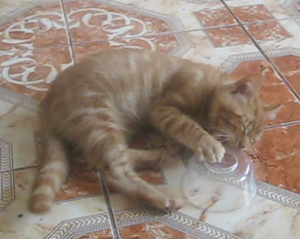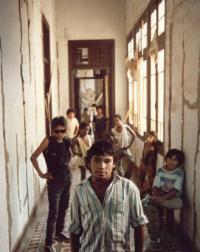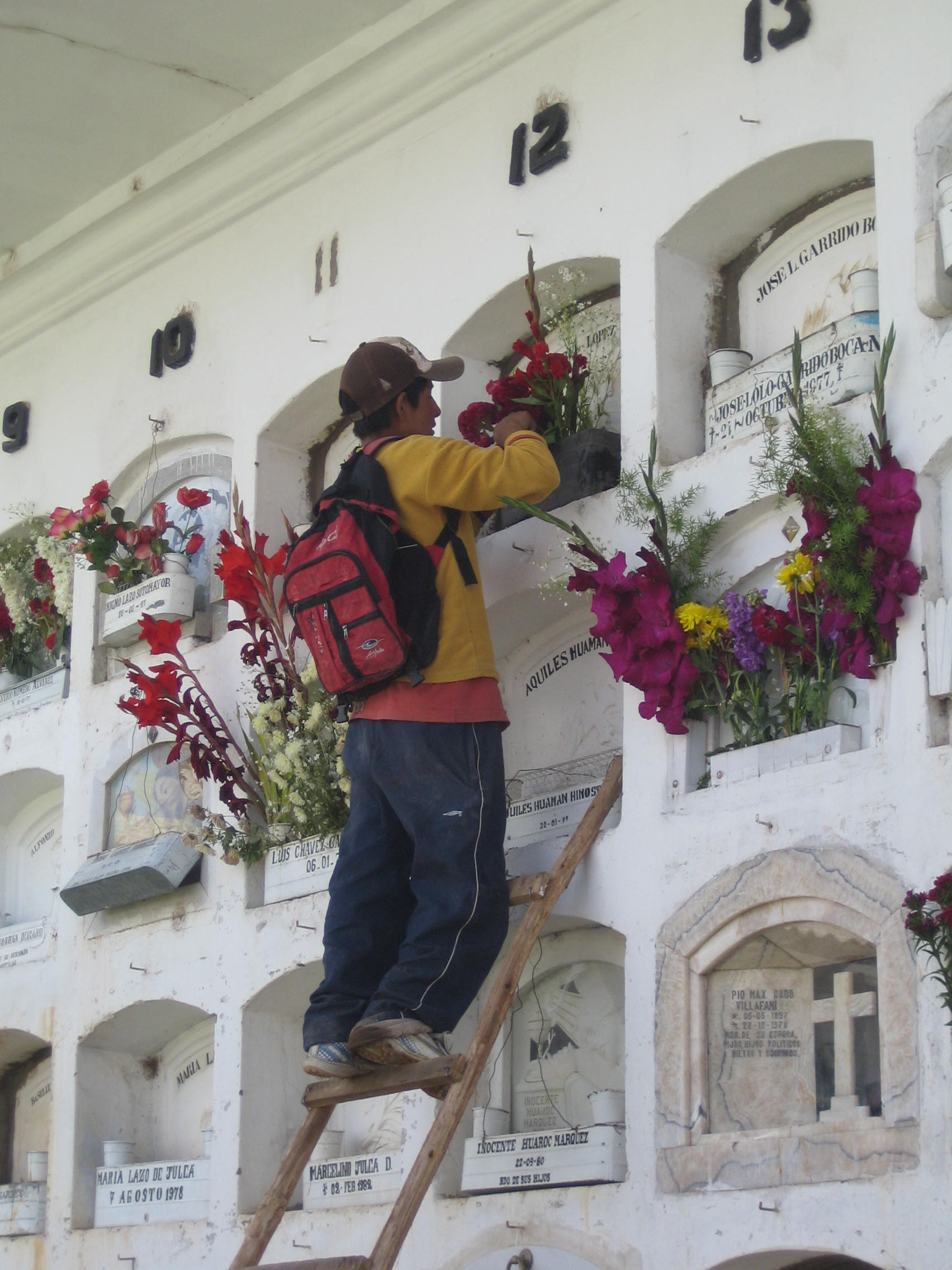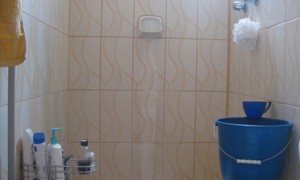“I can live in an adobe house with dirt floors without electricity and get mite infections every few months, but I cannot live without hot showers,” I remember saying back in the day.



Tag: flexibility
Our toilet usually makes an annoying, sporadic dripping or trickling sound. There have also been a few times, before the rooster on the fourth floor wakes up to crow, that the toilet will make an explosive racket, gurgling and spitting up convulsively. The first time we woke up to the auditory chaos, we thought the washroom had flooded. It turns out, this happens when the enormous water tank on the roof is suddenly switched on after being empty for hours. As it fills, the extremely high water pressure quite literally shoots water down to all the apartments below.

Today, the toilet was quiet and the landlady knocked on our door at eight in the morning to advise us to collect as much water as we could. I was prepared. These days, I fill any available empty bottles with water. We can at least use this water to flush the toilet. The most valuable water is the pitcher of boiled, potable water we keep in our fridge. This gets rationed out to ourselves and to Fénix the kitty because we’re never sure how long the water famine will last.
Desperate times call for ingenuity and resourcefulness. We were ecstatic when we thought of bringing down rain water that had collected in buckets near the laundry station on the roof. It was a good thing we woke up early because the early bird catches the worm and wins the precious water. This morning, I had the clever idea of trying to empty any existing water that might have collected in our shower tank. Unfortunately, there were only 10 drops.
But we value what we have.
Have you ever experienced not having a key resource when you needed it? How did you approach the situation?
When 12-year-old Juliana is belted by her step-father 27 times, it’s the last straw; she escapes from the abusive situation and hits the streets. And so begins a tale of courage and resilience in Lima, Peru.

“Juliana” is one of Peru’s timeless classics, brought to screen by Grupo Chaski. Humbly winning over ten international film awards, “Juliana” tells the story of a spirited young girl who takes life into her own hands. She disguises herself as a boy to join a motley crew of talented kids who make money by entertaining in the streets.
The Afro-Peruvian boys from the coast work together — one plays the cajón (a percussion instrument that looks like a box) while the other dances. The boy from the rainforest uses a tin can as a mini drum and güiro, making rhythm by sliding over the side with a stick. He sings on micros (large combis) while another kid collects money from passengers. Other children have turned into thieves.
The street gang is led by the wily Don Pedro. He gives the boys pointers on how to look poor, takes them to the beach and tells them crazy stories, provides them with shelter and feeds them. Unfortunately, he’s also prone to mood swings and demands that each child bring in a certain amount of money each day. Any child who doesn’t make enough suffers Don Pedro’s wrath behind closed doors.

- The widowed mother puts up with her new partner’s abuse because she’s afraid of loneliness.
- An evil, beer-bellied step-father represents Peru’s machismo culture. He’s a drunkard who orders his family members around like servants.
- Juliana works at the ancient Presbítero Maestro, the oldest cemetery in Lima, inaugurated in 1808. She converses with the dead as she cleans their tombs and waters their flowers.
- Juliana chases down and fights with some kids who rob her.
- In their free time, all the kids who work in the cemetery play soccer amidst the tombs.
Juliana will inspire you to never lose your spirit, especially when life gets rough. She will show you what it means to be creative because sometimes creativity is exactly what’s needed to make the best of a bad situation, to find your way and to survive. You can watch “Juliana” in Spanish on YouTube.
Sometimes I forget that I don’t even need to travel outside of my own city to experience language barriers and misunderstandings. What’s beautiful is to be reminded that there’s more to communication than language.
I’m sitting at the bus stop when an old, petite lady sets her bags down on the bench with me. She stays standing. I’m in a good mood and strike up a conversation.
“That will be heavy to carry home.”
“No,” she says shaking her head as if it’s no big deal. She says a few more words – some incomprehensible – but I get the picture that she doesn’t have far to walk. I’m a little surprised that I can’t understand her because she looks European, if not Canadian. I figure I just didn’t hear properly.
“How many blocks do you have to walk?”
“One and a half.”
There is some silence and the conversation seems over.
“You’re Filipino?” she suddenly says. Now, this is surprising. No one ever guesses I have even the slightest Filipino blood – Chinese probably, Korean or Japanese maybe, but never Filipino, never without having seen my last name, and never in Vancouver – a city that boasts(?) the largest proportion of Chinese in Canada.
“Yes! How did you know?” I ask.
She begins to regale me with a story that I continue to not understand. I know she’s speaking English because some words come out loud and clear and she nods firmly after every few sentences, her body language exuding confidence as if I should be following everything she says. I’m trying hard to.
“Five days.”
“Millionaire.”
“Filipino.”
I’m nodding and saying, “Yeah,” intermittently as I collect clues on what she’s talking about. It’s as if we’re actually having a conversation. She convinces me that we are with the way she’s speaking to me – no hesitation, no pauses, no doubts, no verification questions (“Right?” “You know?”) I try to change the subject because I finally realize that she’s talking in circles…I think.
“What language do you speak?” I ask.
“Yes!” she says confidently with a sharp downward turn of the head. I almost forget what question I had and nod in agreement with her.
I try again.
“You speak another language?”
“I speak English.”
I try other ways of asking the question.
“I am Greek.” Oh, that explains it – or does it? I continue to be naïve about the stereotypes of different countries and cultures. I consider my naivete one of my greatest strengths.
The lady is eating an ice cream bar with a purpose.
“Greek-Canadian,” she confirms.
The bus is coming so we both get up and I offer to help her with her bags. There are a lot of senior citizens in my neighbourhood and I often help old ladies carry their bags home. This lady politely refuses with a smile and says “Salamat” – another clue to add to my inventory: maybe this Filipina lady in her life had some sort of influence. Despite her small stature, she assuredly bypasses the line up of people to get on the bus first and secure herself a good seat by the door.
At my stop, I’m conscious to see if she’s getting up as well. It seems like she is, but is she waiting for me to get up first? We have a bit of a miscommunication so I never really get a chance to say goodbye as she gets up. I thank the bus driver and when I walk off the bus, I turn my head slightly to catch a glimpse of whether she got off or not. She seems to be talking to the bus driver, as if convincing him to let her off the next block over. I wonder she is able to get her point across in the same “English” she used with me earlier.
At the end of my block, I turn the corner and look back. She’s walking behind me. The bus driver must have denied her request. I give a hearty wave and she communicates a goodbye with a firm nod my way. I think I see a hint of a smile.
My professor from Canada came to visit for a whirlwind week and packed in…
- A 2-day conference on infant stimulation that we’ve been planning for months,
- A full day of hardcore bulk shopping in the Sunday fair that spans more than 30 city blocks of the main street through Huancayo (mostly jewellery for her and millions of other trinkets that her son can sell back home),
- And the rest of the week was spent conducting full days of research with babies and toddlers in San Pedro de Saño (a little town just outside of the big city).
Part of her assignment here was to conduct mid-internship Coady interviews individually with Maria and me. The question that had me thinking went something like this: “What skills have you learned from your internship that will benefit you in your future work?” Skills, skills, skills. The first skills that came to mind when I thought of what I’ve learned here in Huancayo had nothing to do with my internship. I thought of how I could now fill the kettle without it spilling in pitch darkness, notice the slight difference in sound when the water had started boiling, and how my internal clock knew when the 10 minutes of boiling time was up (to be sure the water was purified) because I do this every morning to make my coca tea. I thought of how I skilled I was at doing laundry by hand (well, sorta). I thought of how I learned to keep an apartment clean (because Maria made me, just kidding – sorta; she was the positive influence, that’s what I meant). And I’d like to say that I can now cook, but just the other day, I suggested we add mango pieces to our pasta dish and Maria said that it would never work. =P It is a skill that will take a much longer time for me to learn, I’m afraid.
In any case, I had to think twice to respond to the actual question. What skills had I learned? Not just any skill, but something that will benefit me in my future field? I’ve learned a heck of a lot about international development – which I didn’t even know existed prior to arriving in Nova Scotia for training – but to be honest, I’m not so sure I’ll be involved in this field in the future. It had to be something more abstract.
Then, it came to me. “Flexibility and patience,” I answered. It is a skill to be able to get along with people from other cultures, whether it’s the Dutch (there is the couple who started the NGO and the other two volunteers from the Netherlands) or the wide variety of Peruvians here (of different ages, ethnic backgrounds, and lifestyles). It’s about learning to accept differences, personal boundaries, and idiosyncrasies, taking everything in with an open attitude instead of succumbing to the natural temptation to judge. For me personally, it was also what I needed in order to learn the language – flexibility in the choice of words (because not every phrase can be translated literally) and patience with myself as I made a million mistakes.
As I thought of that, I realized that another skill I had developed (that I had wanted to develop) was the ability to laugh at myself. Recently, we (the interns in all the different corners of the world) were sent the letters we had written to ourselves at the beginning of everything, in July when we were still in Nova Scotia. I had written, “I hope you learn to laugh at yourself.” I think I had to lose the fear of embarrassing myself especially when you’re learning to speak a foreign language because it’s bound to happen that you’ll be telling someone, “Can I feel myself here?” (sentirme) instead of “Can I sit here?” (sentarme).
It seems to me that a fundamental issue many have once they start working full-time is that they stress out, take things personally, take things too seriously, and start thinking only about themselves and their dissatisfaction. This is when these skills will come into play in my future work: flexibility (letting things be as they are instead of always fitting things into a certain schedule or plan), patience (with myself as I know that I will inevitably make mistakes and I will be the most conscious of this if I ever find myself in a more senior position, with higher expectations of myself and more susceptible to being intolerant of my blunders), and the ability to laugh at myself (to keep relaxed in this way, living life light-heartedly so that I have a balanced relationship with myself, my co-workers, my family, and my friends).
I finally have a key to my room (as of yesterday) and I’m starting to feel like I’m really here, in a new province, away from home. I’ve been exploring the town and meeting the locals on my runs, walks with friends, at the gym, and around campus. The 50 Coady Diploma participants from all over the world are trickling in and I’ve already met:
- the pastor from India, Father Paulson
- the Argentinian with the Russian accent who has worked in Macau for the last 10 years
- the Sudanese who swims naked in rivers (because that’s what they do in South Sudan), and
- the dude from Malawi who was all decked out in a tourist-y shirt and baseball cap with “Malawi” splashed across the front (“Hi, I’m Alex from Malawi,” he says as I shake his hand)
When else would I ever get the chance to chat with, eat lunch with, and take three weeks of workshops and classes with fifty international/community development specialists from all over the world? They’re here for six months for Coady’s development leadership diploma program, but we as interns still get to sponge up as much as we can from them before we head out to our NGOs. When else would I ever get to do this? I am continually challenged to engage in serious, intellectual, political, philosophical conversations on topics that I’ve never even thought about most of the time – other interns are always recommending books to read (notably, Race Against Time by Stephen Lewis) or watching and discussing movies on developing countries in the common room just across from my bedroom. I feel like I can’t keep up! =P
Today is my first day off and I have a lot of catching up to do in terms of both internship-related errands and in this blog. I have so many things I want to post about that I could write a novel on the past week, but I should probably be time-efficient and just get them out in a list of random rambling notes. I figure it’s most important to just get them down so I don’t forget. Then I can come back to reflect upon these ramblings later and talk about them more in depth when I get back home next year and get the chance to meet with you guys in person! =)
Ramblings…
- I had no idea that when people travel, they have a higher risk of engaging in risky sexual behaviour.
- We met the president of StFX who shared some insights and advice on his travels during a lunch with Coady staff. Later, we hear through the gossip mill about what he can be like outside of his presidential role. Only in a small town…! And speaking of small towns – my fantasy of living in a place like Antigonish has been tainted a little as I inadvertently hear more gossip and begin to see how complicated relationships can be here. Imagine having a limited crop of potential suitors, knowing who everyone has slept with, and having everyone know about your nasty break-ups!
- I am so lucky that I have the ability to run. Two of the interns are beautiful and lean ladies, but can’t run anymore because of physical injuries. One was injured just before the triathlon she had signed up for after having been training for many months!
- Advice from a former intern: as a female, if you feel unsafe (e.g. at night in a dangerous part of Africa), approach a sex worker. What a powerful bond there is that connects women from all walks of life.
- Kim’s (the internship program coordinator) philosophy is to squeeze learning opportunities out of every situation. For example, the fact that we don’t have our visas yet? Patience and trust in the system.
- Turn judgment into curiosity. For example, if my NGO has a very roundabout system that seems inefficient, turn the frustrated “Why the heck would they do it this way?” attitude into a pondering “I wonder why they do it this way?” outlook. Look into their iceberg and see the “invisible”/below the surface reasons for their thoughts, actions, and behaviours. Now that I think about it, I guess this goes for any interaction, not just cross-culturally.
- From the sounds of it, development work seems to consist of a lot of planning and reporting, especially when it comes to funding. On a completely separate note, there are also a million acronyms used in this field. Do you know what NGO, CBO, ASRHR, OVC, and PLWA stand for?
- We received our work plans, which were developed last year (because that’s when the funding applications were due). It will be a true test of flexibility and my confidence/trust in my own abilities when we get to our host countries because things will most likely not follow these plans, if at all. I guess that’s what life is like.
- Coady’s philosophy is centred around Asset-Based Community Development (ABCD), capacity building (thanks for explaining this to me, Crystal!), with the view that these communities already work. Our role is to assist these communities in identifying their assets instead of their needs or “what’s missing” (a very paternalistic attitude).
- It will be difficult, if not impossible, to quantify the experience we will have and/or the difference we’re going to make. Change is ongoing, can be internal, and will hopefully continue beyond the time period of out internships, particularly because sustainability is a fundamental theme of all of these projects.
- The more I learn, the more questions I have instead of answers. Development work seems to be an ongoing discussion, as is research, as is morals and ethics, as is determining what it means to live a good life.
- I feel that I’m really good at making eye contact with people, but I start looking away when I’m speaking to people as I try to formulate my words.
- If you find yourself riding in the back of the truck, choose the spot closest to the driver.
- I love how in many parts of the world, fat is beautiful.
- Has anyone ever heard of “sex bracelets”? I think a certain number or colour of bracelets signifies how much sex you’ve had!
- I’ve been writing down all the things I want to blog about so that I don’t forget, but there are already three to four notes that I’ve made that seem completely foreign to me now. Bah!
People that I want to remember
- Cassie’s boyfriend came to visit and we met his friends Mory from the Ivory Coast (in West Africa) and Thesfaye from Ethiopia. It’s weird to think that French is the national language of the Ivory Coast.
- Joseph from Tanzania.
Joseph’s living at our dorm right now and was in Halifax to present at a conference on the radio station that he and his colleagues have started up in the rural Kagawe region. People in Kagawe are in so much poverty that many still don’t have toilets, need to carry water from so far away, and need to grow their own crops despite not being educated as farmers. It is through radio that he’s been able to reach out to the rural communities, broadcasting on issues such as agro-forestry, health, and sanitation. I had a chat with him this morning about how this first trip to Canada has been an eye-opening experience for him. He thought he was making a difference when he planted 500,000 trees in his home country, until he saw all the trees that we have here in Canada. It just goes to show that we often think we know, we understand, we’ve tried our hardest, we’ve made a difference, until we open our eyes a little wider and take in the rest of the world.
I asked Joseph if he ever felt like giving up. Wouldn’t he? After seeing how much more he needs to do, how many more trees he has to plant, how much more work he has to do to educate the people of his country – wouldn’t it be so easy to get lost in the sheer magnitude of the task? He told me three things:
- Use only what you need. He had visited CBC in Ottawa, was given a tour, saw the rows and rows of cubicles and equipment, but instead of feeling overwhelmed with all that he still needed to do with his tiny radio station in Tanzania, he thought about how he had everything he needed. There were some pieces of equipment that he would like to have, but he was striving for one cubicle’s worth of equipment, not to become like the entire CBC station.
- Patience. It took him 15 years to get his radio station up and running and it started with a little collection of resources that turned into a library that turned into a newsletter that turned into information boards that turned into a radio station.
- Be a catalyst. We could drown in thinking about all the little things that could still be done/changed, but if we take the broader perspective and view ourselves instead as a catalyst for change, it almost feels as if we can make a substantial difference in the world.
Copyright © 2024 Samantha Bangayan | Sitemap | Disclosure Policy | Comment & Privacy Policy
All articles and photos in this blog are licensed under the Creative Commons Attribution License CC BY-NC-ND 3.0.
